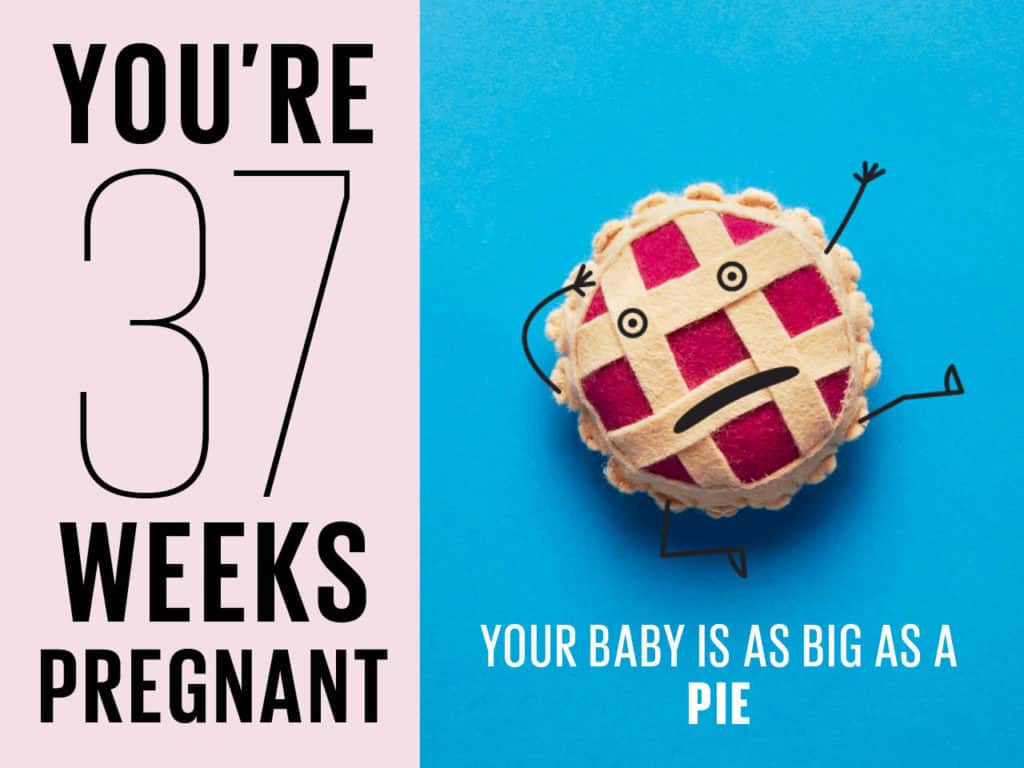
Table of Contents
A baby, in their 37th weeks pregnant after implantation, is considered a term, the mother, on the other hand, this week gets ready for labor.
When you are 37 weeks pregnant your baby, will measure 19.1 inches and weigh 6.3 ounces. To put things in perspective, this would be about the size of a ‘pound puppy’. Isn’t it fascinating!
How Much is 37 Weeks Pregnant in Months?
As you approach the 37th week of pregnancy, you’re entering the eighth and a half months of the standard 40-week term, organized into three trimesters.
Development of baby when you are 37 weeks pregnant
1. Dexterity
The baby, in the 37th week, learns to coordinate using their fingers. They learn to grasp and hold things, like the umbilical cord, their hand, and later your pinkie.
2. Head-down
This week, the baby should be in a head-down position. If for you, the baby is in the breech (feet down) or transverse (side-lying) position, your doctor may talk to you about the external cephalic version (ECV) procedure to flip the position of the baby.
3. Early term
The baby in the ‘early term’ is fully developed and needs only two weeks more to develop the brain and lungs. However, if they are born this week, they’d need extra care in the NICU till week 39.
4. Sucking and swallowing
When you’re 37 weeks pregnant, your baby will start learning to suck and swallowing abilities in preparation for taking feedings after delivery. By 36 to 38 weeks, the coordination of sucking and swallowing is perfect.
5. Size and weight of the baby
When you’re 37 weeks pregnant, the average length of your baby is 19.1 inches (48.5 cm). The baby is 6.3 pounds (2.8 kg) and growing at a rate of half an ounce (14 g) per day.
What is happening to a mother’s body in the 37th week of Pregnancy?
The mother feels pretty pregnant this week and well enough, at least compared to the weeks in the past. You need to be extra kind to yourself and get ample amounts of rest.
Here’s what is happening to a mother’s body in the 37th week of pregnancy: 37 weeks pregnant symptoms
The following are the 37 weeks pregnant symptoms
1. Spotting
As the cervix can be easily irritated, you may have a little spotting, especially after sex. Just in case there is more blood, call the doctor immediately, this could be an indicator of something wrong with the placenta.
2. Gas and bloating
Due to the extra levels of progesterone, the body may feel a little extra bloated or have more gas. In such a scenario, consume smaller meals, stay hydrated, and avoid gassy food.
3. Stretch marks
Do you have tiger-like stripes on the belly, hips, thighs, arms, or the bum? These are tiny tears caused due to the belly stretching as the baby grows or as you gain weight quicker. Try consuming more water and apply oil more often or cream over the marks, they will eventually fade away with your skin.
4. Trouble sleeping
Most pregnant women find it difficult to sleep in their late pregnancy. Try stress-reduction techniques, like yoga and meditation, gentle exercises to help you relax your mind.
5. Nausea and/or diarrhea
6. Braxton Hicks contractions
Doctors have believed these contractions to be toning the muscles for childbirth helping to dilate and efface the cervix. It would then spur the labor contractions, on the other hand, true labor contractions are more regular, unlike Braxton contraction. If you experience them to be painful and more regular, contact the doctor immediately.
7. Baby drops
Anytime in this or the coming week, the baby will drop into the pelvis area, preparing for labor. It could also happen right before the delivery or in a few weeks up the month. You will notice yourself breathing more easily and taking more washroom trips once the baby drops.
8. Cervical changes
In case of vaginal birth, the cervix needs to be softened, dilated, and efface, for which the doctor would make changes in the appointments. These changes (if needed) will then begin to take place weeks before the delivery or at times on the same day.
9. Mucus plug
During the 37th week, there would be mucus plugging the cervix, but, with the dilation and effacement, it plugs out through a discharge. If you feel the mucus being too thick, it could be alarming as you might go into labor, so contact the doctor.
10. Heartburn
When you are 37 weeks pregnant your baby is growing rapidly, which means that the baby is probably putting some pressure on your digestive system, and this pressure can lead to heartburn.
11. Swelling
Due to constant movement, and excessive standing, you could experience swelling in your feet when you are 37 weeks pregnant. Swelling in the nose due to excessive heat and body temperature.
12. Abdominal pressure
If you are 37 weeks pregnant, you can feel a lot of pressure everywhere in your abdomen and this could be an indication of premature labor. To reduce some amount of abdominal pressure, try going into an all-fours position.
Diet and Nutrition Tips; 37 weeks pregnant
Mentioned below are some of the best diet and nutrition tips for women who are 37 weeks pregnant.
- Consume nutrient-dense meals while limiting simple carbohydrates.
- Ensure you receive enough calcium to help your baby’s nervous system and bones develop properly.
- Continue to take your prenatal vitamins, which are critical for the growth of your baby.
- Protein should come from lean meats and poultry, as well as fatty fish.
- Each day, you should consume 27 milligrams of iron.
- Instead of a few large meals, eat smaller, more regular meals.
- Drink water regularly. Keep drinking more water to reduce dehydration, tiredness, and sweating.
What would your belly look like in the 37th week of pregnancy?
You will still gain a pound per week in the 37th week as you have in the earlier weeks. If you feel you are not putting enough weight in the last month of your pregnancy, contact the doctor. It might only be due to the maximum weight gained as needed for the baby’s arrival.
The amniotic fluid starts to reduce hereafter resulting in the bump not increasing much in the 37th week of your pregnancy. The doctor will look into it making sure the baby has enough padding.
For some brownie points, here is a quick checklist to get your sailing through the 37th week of pregnancy:
1. Prepare a list of things to do in the last few weeks before the baby arrives, be it the last-minute chores, keep yourself entertained and relaxed, go on walks, movie nights, and prenatal yoga classes.
2. Put together a “Baby Watch List” with all contacts to inform as soon as the baby arrives. Assign someone for the job, they could be your BFF, partner, or sister.
3. Prepare a birth announcement creative online with a picture, ready to send.
4. Before the labor pains hit you, make sure you have everything you need as you may not have time later. Also, book a pharmacy or amazon for a bottle of Colace, the last thing you’ll need is an undue strain in the lower abdomen.
37 Weeks Pregnant Symptoms To Not Ignore
If you encounter any of the following symptoms at 37 weeks pregnant, it’s crucial to seek advice from your doctor:
- Vaginal spotting or bleeding
- Decreased baby kicks or movements
- Changes in vaginal discharge, including mucous, watery, or red, even if just blood-tinged or pink.
- Burning or Painful urination, potentially indicating a bladder infection.
- Fever or chills exceeding 100.4 degrees F.
- Vomiting accompanied by a fever or pain
- Sudden vision alterations, flashing lights, fading, blurring, auras, or “floaters.”
- Severe or persistent headache.
- Unusual swelling, particularly in the face, eyes, and hands, or sudden or severe swelling in the feet or ankles.
- Abdominal injury from a fall or accident.
- Severe itching of the palms, torso, soles, legs, arms, or a general feeling of itchiness.
- Pain in the upper belly or shoulder, especially under the ribs on the right side.
- Exposure to communicable diseases like chickenpox, flu, rubella, COVID-19, or Zika virus.
- Severe anxiety or depression
- Any other existing health problem worsening, even if unrelated to pregnancy, such as a bad case of asthma or a lingering cold that does not improve. If you notice any persistent health issue worsening, contact your physician.
These are the 37 weeks pregnant symptoms to not ignore. If something doesn’t feel right in your body, consult your physician.
To Conclude
Here is a little checklist for you to go through,
1. Visit the 37th week prenatal.
2. Get Group B Strep test done.
3. Pick a pediatrician, so they are aware of your medical records and what they could expect from you. Also, have the contact information handy in the hospital bag.
4. Sort things out at work so parental leave is uninterrupted.
5. Prepare a “Baby Watch List” to share the news with as the baby arrives.










